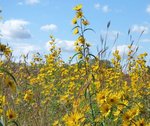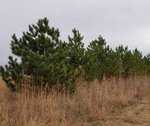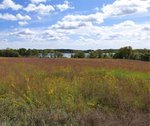



The Rice Soil and Water Conservation District has selected Steve and Faith Lund of rural Faribault as the 2022 Wildlife Enhancement Award winners for Rice County.
The Wildlife Enhancement Award recognizes individuals or organizations who do an exemplary job in implementing conservation practices that benefit Rice County wildlife.
For over sixteen years, the Lunds have been committed to providing habitat for wildlife and improving the water quality of Fox Lake in Rice County.
The Lunds decided to enroll 29 acres of their land in the Conservation Reserve Program (CRP) in 2006. At the same time, Faith and her siblings also enrolled 15 acres of farmland adjacent to the property, in honor of their late mother, Lorraine Andersen Olson.
“My mom was a steward of the land and valued the wildlife that visited the farm as well as Fox Lake,” said Faith. “We felt that restoring the property back to wildlife habitat and providing a buffer to the lake would be what she would have wanted. The Conservation Reserve Program made that possible,” she concluded.
The Lunds worked with the Natural Resources Conservation Service and Minnesota DNR-Forestry to develop a plan to restore the native prairie and plant deciduous hardwood trees through a direct seeding.
Steve took on the role of managing the restoration of the properties. In total, 42 acres of native tallgrass prairie was restored on the property. Big blue stem, Maximillian sunflower, Indian grass, bergamot, and milkweeds are some of the species that grow and provide excellent habitat for pollinators.
Two and a half acres of deciduous hardwood trees including walnuts, oaks, and ash were also planted through a direct seeding. Steve also planted some pine trees (through the Rice SWCD Tree Sale Program) to provide winter habitat for wildlife.
The biggest challenge to managing the CRP was keeping the invasive/volunteer weeds and trees out of the restoration. Volunteer willows, Siberian elm, European buckthorn, boxelder, sumac, and thistle are species that constantly creep their way into the habitat.
“Originally I did it all by hand,” said Steve. I walked all the acres and cut all the weeds and invasive trees with a brush cutter. Around 2012, I bought a four-wheeler and pull-behind brush mower and I also started using herbicide to control the invasives.”
Steve works diligently to manage the native prairie. Besides controlling weeds and volunteer trees by spot mowing and spraying, controlled burning has also been used to control the weeds and stimulate the growth of native wildflowers.
Finally, Steve has placed bluebird houses and wood duck boxes around the property and planted clover food plots for the wildlife.
“It is rewarding to watch how things have changed over the years,” said Steve. “We see lots of turkeys, deer, and the prairie has become even more diverse with milkweeds and other wildflowers. We see so many Monarchs visiting the prairie during the summer. As a hunter and an outdoorsman, it is gratifying to see wildlife in a healthy habitat,” he concluded.
The properties border Fox Lake to the north and provide incredible wildlife habitat for the animals that live around the lake. The prairie restoration prevents soil erosion and provides a high-quality buffer to filter surface water runoff. Fox Lake drains into Wolf Creek and then into the Cannon River at Dundas. The water then flows through Lake Byllesby before it empties into the Mississippi River at Red Wing. Their choices to conserve soil, prevent erosion, and improve water quality positively affect many downstream in the watershed.
The Rice SWCD thanks Steve and Faith Lund for their commitment to improving wildlife habitat and improving water quality. They make an outstanding choice for the 2022 Wildlife Enhancement Award.